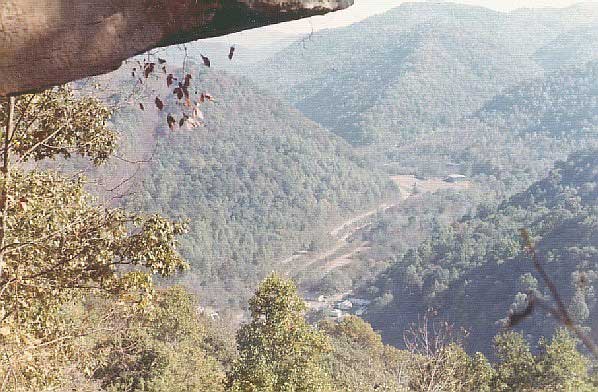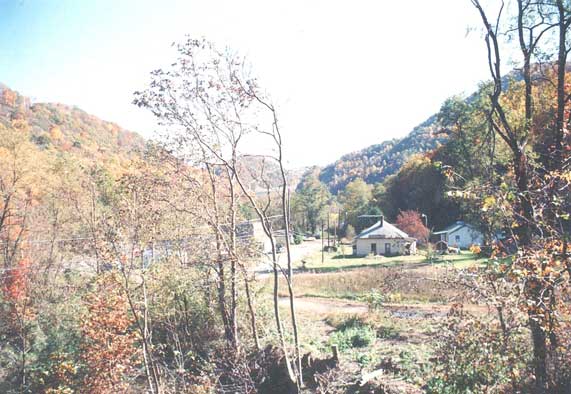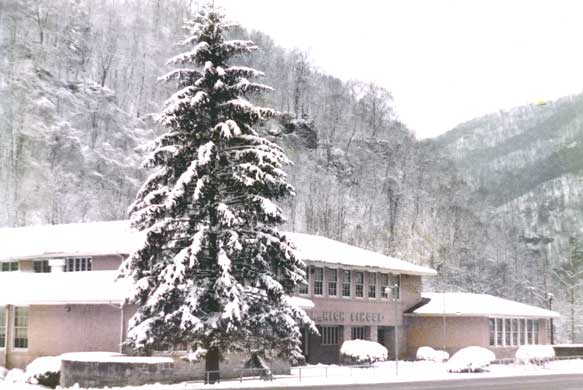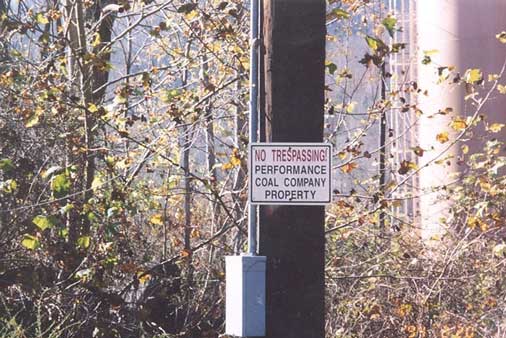The Coal River Valley, West Virginia (Photo by Rick Bradford)It’ll Make Cold Chills Go Up And Down Your Spine
By Rick Bradford
(Ed. Note: Long-time Edwight resident Rick Bradford has been diligent in chronicling the history of the coal mining region where he lives, including the systematic dismantling of Edwight in the face of Big Coal’s lust for land. Bradford has graciously allowed us to reprint this chapter from his self-published book of Edwight memories and photos, EDWIGHT: Near the Mouth of Hazy. We have not changed a word, but rather prefer to let the voice of a man who has witnessed the punishment inflicted on his native soil, taken the testimony of others who came before him and were trampled asunder by the coal industry, and set it down in print for all to see, as it was told to him or as he remembers it.)
Frederick III of Prussia told us, “What can’t be helped had best be forgot.”
King Pettry Sr. didn’t see it that way telling John P. West, when asked to help fight a forest fire raging on the hillside above Edwight, “If I could go up there and piss on it and put it out, I wouldn’t. You stole this land from my Grandpa!”
Donna Mae Kyle, his daughter, saw the Raleigh-Wyoming Mining Company as the savior of the town. And probably it was. The town was dismantled after the mining company left and what remained was just a shell of its former self.
In memory, the town of Hazy Eagle is almost an apparition. You can still see some of the ghosts in the old house foundations, cellars, toilets, and drift mouths.
The simpler times seemed to have been abandoned: simpler times when women made their own wallpaper paste from flour and water and when Grandma would get Mrs. Perry to help her hang the wallpaper. When the paper would fall, both Grandma and Mrs. Perry would be wrapped up like Egyptian mummies. But when that wallpaper dried, it hung perfectly for years.
Only the fragment of a memory remains of Mrs. Tucker’s birthday party for her daughter, Velma, when she served cold chocolate with icicles used as stirrers.
The old Hazy School, where they sang:
Two babes lost in the woods,
They sobbed and they sighed,
And laid down and died.
And the robins it’s said,
Picked strawberry leaves,
And over them spread.
Poor babes in the woods.and where Grandma accompanied Mrs. Shumate when she walked her class out onto Bailey Mountain has long been forgotten.
The “doghouse” where the tipple workers warmed their hands and the fountain where train passengers drank are long-time forgotten.
The once-thriving town of Edwight as it is today. (Photo by Rick Bradford)No one speaks anymore of the shades seen at the “Big Onion” although the ghosts are still there. The specter that Sonny Richards saw dancing in midair still does her lonely dance. The ghostly dog that came out of the Boardtree Hollow and advanced toward my mother as she skipped over railroad ties as a little girl is still there. But no one is allowed in Hazy to observe these things, because Massey Energy has it gated
and guarded.Stringtown reveals no evidence whatsoever of past habitation because everything was bulldozed when J.P. Hamer built a sawmill on the old tipple site in 1961, stacking lumber on both sides of the road.
Edwight’s black community on the side of the hill is still dotted with old toilet bases, house foundation blocks, and whiskey bottles.
That tiny quarter contributed a lot of talent to the world—gifted people like Mary Carter Smith, niece of “Aunt Booby” McAdory. Smith, a professional storyteller, has performed her stories throughout the world as a “keeper of memories.”
Priscilla Price, daughter of an Edwight coal miner, is following her own singing career after performing with the great Sam Cooke and the great Lloyd Price.
Shumates Branch is currently under water and coal sludge.
Bailey Mountain ceases to exist, as Massey Energy’s massive mountaintop removal strip mining has torn the mountain asunder.
Victor Gabany, Bill Monroe’s “top sound man” in Nashville, was here when Edwight was taken apart. But only the steel bridge across Coal River has witnessed the entire journey of the town.
Peak employment for Raleigh-Wyoming’s mines was about 1,100 men. At the end, employment was 73.
Clark and Krebs’s Hazy and Raleigh-Wyoming’s Edwight mines had an official death toll of 72 men, but we must add the names of Bentley Cox, Tommy Crawson, and Ken Adams.
In November 1952, Virgil Adams augered into No.1’s water—water under such pressure that it stripped the whole hillside of soil and vegetation as it surged down to the creek.
In late March 1980, in a repeat performance, the old Hazy mine “blew out” with water pouring from the opening at the rate of 300 cubic feet per second taking out part of the road.
In the late 1920s and into the ‘30s, Finley and Virginia Massey, Dorothy Dean, my Mother and my uncles had to walk out of Hazy to Edwight no matter what the weather to catch the school bus to Marsh Fork High School.
Marsh Fork High School (Photo by Rick Bradford)King Pettry and Dewey Goodyear set a still on a dry spot in No.1 mine after they walked over roof falls exposing tree roots and blue sky to their view. Dewey had on a pair of wading boots and he carried King across the ponds of water.
Bessie Dexter cut “Popeye” John’s stomach open with a butcher knife after receiving a beating at his hands.
Homebrew was made, sold, and traded by half of the residents in Colored Camp. Sadie and Cotton sent a man home one time with a quart of homebrew in his hand and no shoes upon his feet.
Velvie Raines used to call stores and ask if they had Prince Albert in a can. If they answered, “Yes” she would say, “Why don’t you let him out.”
But times have changed.
In 1960, Orville Jarrell was cutting hair in his new shop at Stickney, Dr. Lee was doctoring in his new office at Rock Creek, Golden Pettry was tearing down the Edwight company store, Roosevelt Saunders was dismantling the wooden coal tipple in Hazy, and King Jr. was delivering commodities with Uncle Richard.
John F. Kennedy, while campaigning in Welch in 1960, said: “Unless the next administration deals with the question of what to do with men when machines have thrown them out of work…what has happened here in West Virginia is going to happen all across the country.”
Part of the problem was the absentee ownership of West Virginia. Out-of-state interests have always owned most of the mineral rights of this state—a fact that prompted Governor William D. Dawson to send this message to the 1909 legislature:
“It has been a fight all along the line to get upon the books this property what is now upon them… It is a disgrace that we enact laws which put on the tax books the full value of the property of widows and orphans and let go untaxed these resources which are the property largely of the rich.
“The arrogance practiced by some of these interests as regards the taxation of their property, and the evasion resorted to cheat the state of what rightly is due it, are reprehensible to the last degree.”
The state Tax Commission had already issued a report on November 22, 1884:
“The wealth of this state is immense, the development of this wealth will earn private fortunes far beyond the dreams even of a modern Croesus; the question is whether this vast wealth shall belong to persons who live here and who are permanently identified with the future of West Virginia, or whether it shall pass into the hands of persons who do not live here and who care nothing for our state except to pocket the treasures which lie buried in our hills?
“If the people of West Virginia can be roused to an appreciation of the situation, we ourselves will gather this harvest now ripe on the lands inherited from our ancestors; on the other hand, if the people are not roused to an understanding of the situation, in less than 10 years this vast wealth will have passed from our present population into the hands of nonresidents, and West Virginia will be almost like Ireland and her history will be like that of Poland.”
While Edwight’s residents were enjoying the dances held at the pavilion behind George Barefield’s house and the school carnivals and Christmas pageants, the absentee landlords were busy partaking of the area’s coal, timber, and gas.
The same thing is happening to us today, and to the rest of America, as the “shadow government” of bankers, industrialists, and politicians is stealing our country while we sit idly by watching sporting events on TV.
Nothing much has changed when it comes to impoverishing a people and their culture.
Once upon a time, Old Lady Hundley told Grandma, “You ought to hear my boy Leonard play and sing, ‘In the pines, in the pines, where the sun never shines.’ It’ll make cold chills go up and down your spine.”
But that was long ago and far away.
Like the old fox said, “There was a time.”
Founder/Publisher/Editor: David McGee
Contributing Editors: Billy Altman, Laura Fissinger, Christopher Hill, Derk Richardson
Logo Design: John Mendelsohn (www.johnmendelsohn.com)
Website Design: Kieran McGee (www.kieranmcgee.com)
Staff Photographers: Audrey Harrod (Louisville, KY; www.flickr.com/audreyharrod), Alicia Zappier (New York)
E-mail: thebluegrassspecial@gmail.com
Mailing Address: David McGee, 201 W. 85 St.—5B, New York, NY 10024




